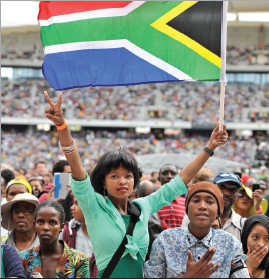On the evening of December 5, the world lost an exceptionally courageous leader in the struggle against racial oppression and social injustice. The beloved South African statesman—freedom fighter, former political prisoner and Nobel Peace Prize winner—died of a respiratory infection at his home in Johannesburg. He was 95. Although Mandela led a long life and his passing was not unexpected, his death unleashed a worldwide outpouring of mourning and accolades. More than 100 world leaders attended his memorial service on December 10. The unprecented turnout included four U.S. presidents: Barack Obama, George W. Bush, Bill Clinton and Jimmy Carter. Thousands of South Africans attended public memorial services across the country.
“Nelson Mandela is perhaps the most influential and important individual of the past century. Overcoming unimaginable adversity, he affected more change than most current world leaders combined,” said GO publisher/editor-in-chief Amy Lesser. “Responsible for the end of racial tyranny in South Africa, Mandela went on to lead the country as its first post-apartheid president. Among innumerable other accomplishments, he is credited for creating the world’s first constitution to protect people against discrimination based on sexual orientation.”
Mandela spent 27 years in prison before leading South Africa out of decades of racial segregation and discrimination. South Africa’s first postapartheid president, Mandela fought fearlessly against racial oppression in his country. He advocated change with hope, forgiveness and peaceful reconciliation, not vengeance or violence. His message of peace, tolerance and compassion inspired millions around the world. Although he is best known for his anti-apartheid activism, Mandela was a strong supporter and ally of the LGBT community. He is recognized for establishing the world’s first constitution to include protections against discrimination based on sexual orientation. The constitution, adopted in May 1996, helped to end the ban on lesbians and gay men serving openly in South Africa’s military. Throughout his life, Mandela was an outspoken advocate of LGBT equality. In addition to creating constitutional safeguards for gay men and lesbians, he also appointed an openly gay judge to South Africa’s High Court of Appeals.
Mandela will be missed not only for his heroic struggle to overcome racism, but also for his steadfast commitment to equality for all people.
“[T]he world is in mourning as we say goodbye to a great man, a great leader, and a great champion against the forces of oppression,” said New York City Council Speaker Christine Quinn in a statement. “In a nation ravaged by racism, poverty and inequality, Nelson Mandela faced seemingly insurmountable obstacles—yet he never relented in his fight for the people of South Africa.”
Chad Griffin, president of the Human Rights Campaign added: “Nelson Mandela tore down oppression, united a rainbow nation, and always walked arm-in-arm with his LGBT brothers and sisters—and with all people—toward freedom. Though every man, woman and child who seeks justice around the world mourns this loss, his vision of an equal future lives on undimmed.”



What Do You Think?